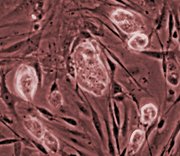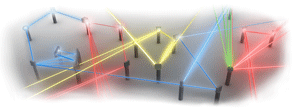| Stem Cell Research [Sciencebase Science Blog] Posted: 16 May 2008 07:00 AM CDT  Lots of visitors are hitting the Sciencebase site look for information on stem cell research. It is a subject I’ve written about before, both on this site and elsewhere, but I thought it might be useful, given that my alma mater is at the forefront of stem cell research in the UK, to provide a FAQ on the subject of stem cells. Just to be clear, usually when the media uses the phrase stem cells, they really mean human embryonic stem cells, but that occasionally takes print journalists over the wordcount, so it’s commonly abbreviated to stem cells, so for the sake of brevity, I’ll do the same here. Lots of visitors are hitting the Sciencebase site look for information on stem cell research. It is a subject I’ve written about before, both on this site and elsewhere, but I thought it might be useful, given that my alma mater is at the forefront of stem cell research in the UK, to provide a FAQ on the subject of stem cells. Just to be clear, usually when the media uses the phrase stem cells, they really mean human embryonic stem cells, but that occasionally takes print journalists over the wordcount, so it’s commonly abbreviated to stem cells, so for the sake of brevity, I’ll do the same here.
- What are stem cells?
Stem cells are primordial cells that can divide without limit and differentiate into the various types of cell used to build our livers, hearts, bones, brains, skin, and other organs, blood cells, nerves etc. More details. - Where are stem cells found?
Pluripotent stem cells, which can form any cell type, can be harvested from human embryos that are just a few days old. - What do researchers do with harvested stem cells?
Harvested pluripotent stem cells can be cultured in the laboratory to create “stem cell lines” for research and development. - What can be done with cultured stem cells?
A cultured stem cell line can multiply indefinitely in the lab, so once produced researchers can use the same line without having to harvest new stem cells. - What might stem cells be used for?
Cultured stem cell lines can be “engineered” to differentiate into specific cell types, which researchers are hoping can be transplanted into a patient to treat a wide range of problems, including cancer, spinal cord injury, stroke, burns, heart disease, diabetes, birth defects and neurodegenerative disorders, such as Parkinson’s and Alzheimer’s disease. - Have researchers cured diseases with stem cells?
Not yet, stem cell research is little more than a decade old and is very much in the experimental stages. Legal, funding, and ethical issues in the US, UK and elsewhere have slowed stem cell advances during this time to some degree. - So, no cures yet?
The well-known bone marrow transplant uses the blood stem cells found in bone marrow and has been used to treat a range of diseases, such as leukaemia, for four decades. - Do embryos have to be used to harvest stem cells?
Not necessarily, the umbilical cord is being researched as an alternative source of stem cells that would sidestep some of the ethical issues associated with embryonic stem cells. There is also research into using tissue-specific stem cells from adult donors. A much more detailed FAQ on stem cell research can be found on the ISSCR site. A post from David Bradley Science Writer Stem Cell Research  |
| Proposal to divert the mighty Mississippi [Earth & Sky Podcast] Posted: 16 May 2008 04:05 AM CDT Hear about a plan to divert the Mississippi River, in order to rebuild the coast ravaged by Hurricane Katrina and create a more sustainable coastal delta. 
This posting includes an audio/video/photo media file: Download Now |
| First Laser [Excited Light] Posted: 16 May 2008 02:51 AM CDT 
May 16, 2008. Above is today’s Google logo. The first working laser was demonstrated on May 16, 1960 by Theodore Maiman at Hughes Research Laboratories.
According to Wikipedia. 
|
| Sometimes a soul is perfect before birth and God decides it is time [DCS Security] Posted: 15 May 2008 11:37 AM CDT Nathan Green Cupps Born May 14 2008 Died May 14 2008 Tough Week 
|
| In aftermath of Katrina, children still suffer [Earth & Sky Podcast] Posted: 15 May 2008 04:05 AM CDT “Many children, while they’re pleased to be back, are showing symptoms of post-traumatic stress, depression, or problems when there’s a thunderstorm.” An expert talks about New Orleans children’s mental health in the aftermath of Hurricane Katrina. 
This posting includes an audio/video/photo media file: Download Now |
 Lots of visitors are hitting the Sciencebase site look for information on stem cell research. It is a subject I’ve written about before, both on this site and elsewhere, but I thought it might be useful, given that my alma mater is at the forefront of stem cell research in the UK, to provide a FAQ on the subject of stem cells. Just to be clear, usually when the media uses the phrase stem cells, they really mean human embryonic stem cells, but that occasionally takes print journalists over the wordcount, so it’s commonly abbreviated to stem cells, so for the sake of brevity, I’ll do the same here.
Lots of visitors are hitting the Sciencebase site look for information on stem cell research. It is a subject I’ve written about before, both on this site and elsewhere, but I thought it might be useful, given that my alma mater is at the forefront of stem cell research in the UK, to provide a FAQ on the subject of stem cells. Just to be clear, usually when the media uses the phrase stem cells, they really mean human embryonic stem cells, but that occasionally takes print journalists over the wordcount, so it’s commonly abbreviated to stem cells, so for the sake of brevity, I’ll do the same here.
No comments:
Post a Comment